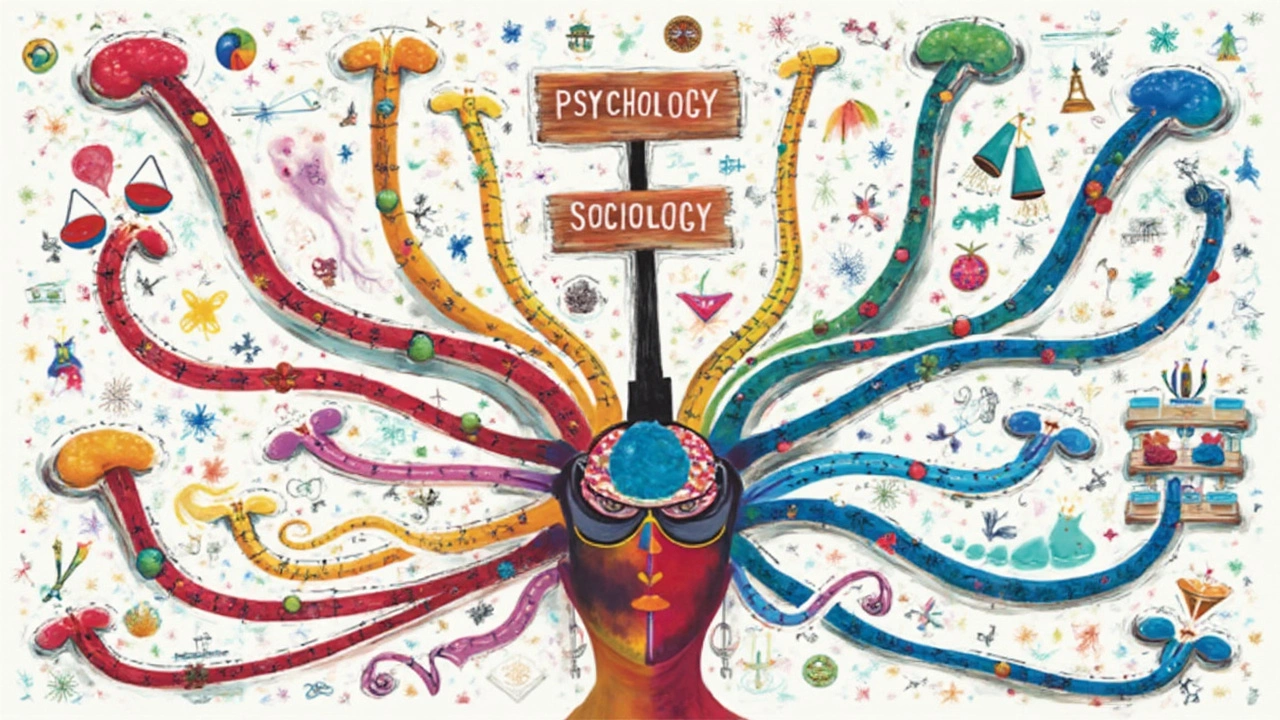Figuring out the 'easiest' A-Level subject might feel like trying to crack a complex code. But does easy mean less work, or does it mean something more personal, like aligning with your natural talents? The key isn't about going for the subject with the least amount of content; it's about finding something that clicks with you.
Take for instance, Psychology. It's often labeled as one of the easiest A-Levels by students who enjoy diving into how the mind works and don’t mind learning through case studies. Many students find the content engaging and relatable, which can make studying feel less like a chore.
But before jumping to conclusions, think about what truly interests you. Do subjects like Sociology or Media Studies catch your eye? They’re known for their practical coursework and minimal heavy-duty exams, offering a balance of theory and hands-on experience.
Understanding your strengths plays a big role here. If you find essays a breeze, then subjects like English Literature could be your frontrunner. On the other hand, if you’re good at quick calculations but not so thrilled about extensive writing, then perhaps maths might be surprisingly easier for you than expected.
- What Does 'Easiest' Mean?
- Top 5 Popular Choices
- Tips to Make the Right Choice
- Balancing Passion and Practicality
What Does 'Easiest' Mean?
Picking the easiest A-Level isn’t straightforward because ‘easy’ isn’t universally the same for everyone. It's all about how well the subject fits your strengths and interests. What feels easy for one person might be a real head-scratcher for someone else.
It's All About Personal Strengths
Let's break it down. If you're someone who loves to explore and understand society's quirks, then Sociology could be your ally. Its concepts could feel more intuitive and require less memorization than something like chemistry.
Interest Makes a Difference
Your interests play a huge role. For instance, if you're curious about reading people and their behaviors, Psychology might engage you more. You’ll find understanding theories easier because it all feels relevant.
Balancing Workload vs. Motivation
Some might think Media Studies is simple due to its creative nature and fewer exams. But consider your motivation and what you enjoy doing, like video projects or analyzing advertisements. What might seem straightforward on the outside could demand creativity and attention to detail.
Consider the Data
Let's peek at who often scores the highest. In 2023, subjects like Mathematics and Economics had a surprising number of top grades, indicating that students with a knack for numbers might find them more manageable and rewarding.
| Subject | Top Grades % |
|---|---|
| Mathematics | 35% |
| Economics | 30% |
So, when you're on the hunt for the easiest A-Level subject, think about your interests, strengths, and what naturally piques your curiosity. It’s not just about what’s easy on paper but what feels right for you.
Top 5 Popular Choices
When it comes down to selecting the A-Level subjects that are perceived as easier, there are common choices students tend to gravitate towards. Keep in mind, these choices are not universal; your ease with a subject can be different from others depending on your interests and strengths.
1. Psychology
Psychology is often seen as a straightforward subject for those who are curious about human behavior and mental processes. Students appreciate its relevance to everyday life, making the theories easier to grasp and more interesting to study. The subject typically involves exams and coursework, and the use of case studies can help ground abstract theories.
2. Sociology
Sociology dives into the study of society and human interaction. Many students find it appealing because there's a lot of current topics and relatable content. It usually involves essays and projects, allowing for creative expression. This A-Level is especially suited for those who enjoy discussing social trends and observing patterns in human behavior.
3. Media Studies
Media Studies offers a blend of practical and theoretical work, which can help lighten the load for those who prefer dynamic learning as opposed to rote memorization. Students analyze current media, plan projects, and sometimes even create their own content, keeping the curriculum exciting and engaging.
4. Business Studies
Business Studies can be incredibly appealing for those looking to understand the corporate world. The content is practical and relevant, breaking down fundamental aspects of the business, like marketing and finance, into bite-sized pieces. If you're considering a future in business, this subject might just click.
5. English Literature
For students who have a knack for writing and analyzing texts, English Literature often comes across as manageable. Diving into classical literature and contemporary works allows students to hone their critical thinking and writing skills. Plus, if essays are your strong suit, this could feel like a perfect fit!
These popular choices not only offer potentially 'easier' paths but also open doors to developing skills that are valuable in higher education and beyond. Remember, what truly makes a subject easy is how well it aligns with your personal strengths and how engaging you find the content.

Tips to Make the Right Choice
Choosing the right A-Level subject isn't something to rush into. It can shape your future career path, so it's worth giving a bit of thought. Here are some tips to guide you.
Know Your Strengths
First off, recognize what you're good at. Are you a whiz with numbers? Or do creative essays come naturally to you? Matching your strengths to a subject can make learning more enjoyable and less stressful. Don’t just go for the easiest A-Level—consider what's easy for you personally.
Think About Your Future
What's your big plan? University or an apprenticeship? Some A-Levels are prerequisites for certain university courses. For instance, if you're eyeing a medical career, subjects like Biology and Chemistry are usually a must.
Get Advice
Don't hesitate to talk with teachers or career advisors. They can provide valuable insights about what each subject involves. Plus, they might know how past students felt about different subjects.
Research Exam Boards
Different A-Level subjects can vary slightly depending on the exam board. It won't hurt to do a bit of research into how they structure and assess their exams. This can give you a clearer idea of what to expect.
Balance Coursework and Exams
Think about whether you prefer continuous assessment or exams at the end of the year. Subjects like Sociology often include a nice mix of both, which can take the pressure off during exam season.
By taking your time and considering these factors, you can choose the right A-Level subjects that fit your interests and future plans. With a little planning, your choices can lead to a much smoother A-Level experience.
Balancing Passion and Practicality
Choosing the right A-Level subject often feels like you're stuck between two worlds: what you love and what might be the most practical for your future. But who says you can't have both? It's all about finding a balance that works for you.
Let’s break it down. First, ask yourself where your genuine interests lie. If you've always been fascinated by film and media, Media Studies could be right up your alley. But what if the job market in your area is booming in tech sectors? That's where a subject like IT could come in handy.
Identify Priorities
Start by listing what you enjoy versus what aligns with potential career paths. You don’t have to sacrifice passion for practicality, but it does help to have a realistic understanding of what each subject can offer you.
- Love numbers? Check out statistics about Mathematics A-Level grads entering fields like finance, where value is placed on analytical skills.
- If writing essays brings you joy, English or History might be perfect, and there are plenty of roles valuing communication skills.
Career Outlook
Many fields appreciate diverse skill sets. A blend of subjects like Business Studies alongside Art can prepare you for creative roles within corporate environments. Here's a small insight for you:
| Subject | Practical Career Paths |
|---|---|
| Psychology | HR, Marketing, Therapy |
| Digital Media | Social Media Management, Web Design |
Practicality isn't just about choosing the subject with the highest earnings straight away. It's also about sustainability. You want to look forward to lectures and assignments for months, even years down the line!
Blend and Balance
Thinking of mixing a creative subject with a more traditional one? Good choice! This combination can broaden your opportunities and make you stand out in a pool of candidates who often follow the tried-and-true path.
In the end, the easiest path is often the one where passion supports practicality. Consider your interests as your primary compass, but don't ignore the landscape of opportunities. It's your future experience that matters most, not just the choice at hand.






